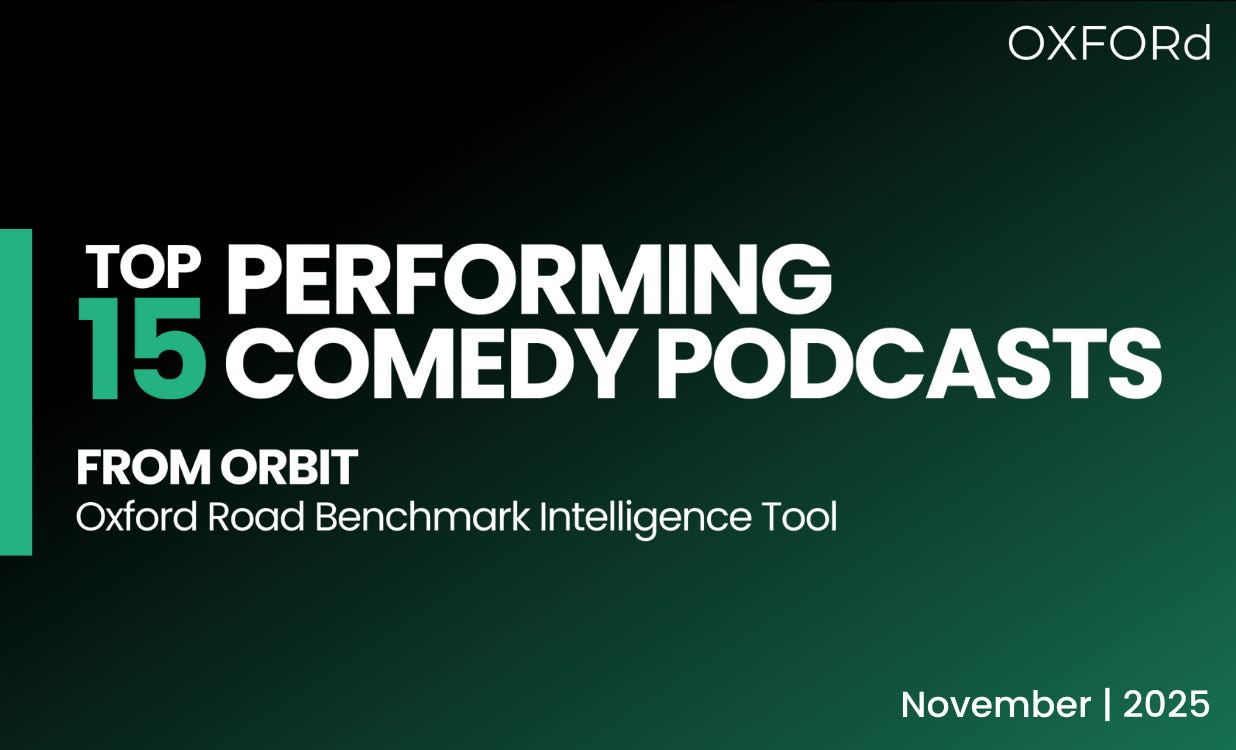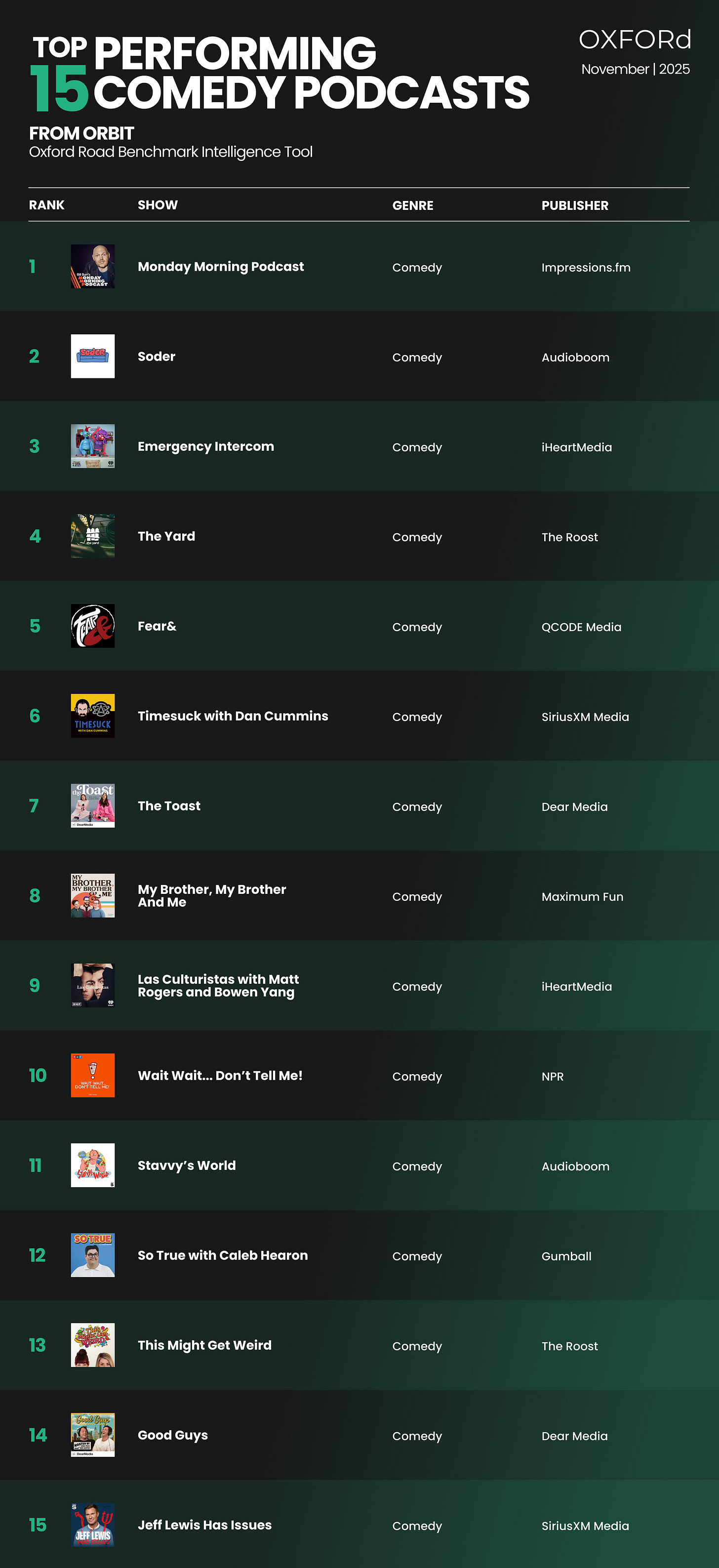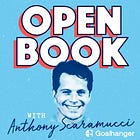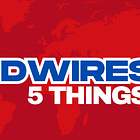Bill Burr Outperforms SmartLess in Sales. The Podcast Ad Market Has Been Lying to Itself.
This piece is freely available to read. Become a paid subscriber today and help keep Podwires financially afloat so that we can continue to pay our writers for their insight and expertise.
Podwires Rundown : SmartLess hosts three A-list Hollywood celebrities. It regularly tops download charts. Major advertisers line up to buy spots. And according to Oxford Road’s new sales effectiveness ranking, it doesn’t even crack the top 15 comedy podcasts for actually moving product. Meanwhile, Bill Burr—who routinely says “wildly offensive things” during his ad reads—converts listeners into customers better than anyone else in comedy podcasting.
Here’s the uncomfortable part: the industry has spent years optimizing for the wrong metrics. Download numbers and celebrity wattage don’t predict sales performance. Authenticity and audience engagement do. Oxford Road just proved it with $1.6 billion in actual campaign data.
The Key Points:
Bill Burr’s Monday Morning Podcast delivers the best sales performance among all comedy podcasts despite—or because of—his unfiltered approach to ad reads that includes “wildly offensive” commentary
SmartLess, hosted by Jason Bateman, Sean Hayes, and Will Arnett, failed to make the top 15 for sales effectiveness despite massive download numbers and celebrity power
NPR’s Wait Wait Don’t Tell Me ranked high for direct response performance, demolishing the industry assumption that NPR podcasts only work for upper-funnel awareness campaigns
High performers include Las Culturistas, Stavvy’s World, and Fear& (hosted by streamers Hasan Piker, Will Neff, QTCinderella, and AustinShow)—shows with engaged niche audiences rather than broad celebrity appeal
Oxford Road’s ORBIT tool analyzed actual customer acquisition costs and return on ad spend from real campaigns, not vanity metrics like downloads or reac
h
Why It Matters :The podcasting industry has been selling ads based on a fundamental lie: that big audience numbers automatically translate to sales results. Oxford Road’s data exposes the gap between what advertisers pay for and what actually drives revenue. When a show with three Hollywood stars gets outperformed by a comedian doing unscripted, occasionally offensive ad reads, that’s not an anomaly—it’s evidence that podcast advertising effectiveness has almost nothing to do with polish and everything to do with audience trust and engagement. Advertisers have been overpaying for celebrity shine while undervaluing authentic creator relationships.
The Big Picture : For podcasters, this ranking demolishes the tyranny of download metrics. Bill Burr proves that smaller, intensely loyal audiences who trust the host convert better than massive audiences who tune in for celebrity guests. His willingness to break the fourth wall during ad reads—even saying things that make advertisers uncomfortable—strengthens rather than weakens his commercial effectiveness. The lesson? Stop trying to sound like a professional announcer. Your audience values authenticity over production quality.
For producers and ad sales teams, the SmartLess absence should trigger immediate strategy recalibration. If you’ve been pitching shows based on download numbers and celebrity hosts, you’re selling the wrong value proposition. Oxford Road’s data suggests that engaged niche audiences with high host trust outperform broad reach every time. Sales teams need to start emphasizing audience engagement metrics, host authenticity scores, and conversion data rather than CPM and reach.
The NPR finding deserves special attention. Wait Wait Don’t Tell Me ranking high for direct response advertising contradicts years of industry conventional wisdom positioning NPR as purely an awareness play. If NPR can drive sales, the problem wasn’t the network—it was how advertisers and agencies understood and deployed it. This suggests the entire industry has been leaving money on the table by miscategorizing shows based on brand perception rather than performance data.
Most importantly, Oxford Road built this ranking from $1.6 billion in actual campaign data measuring real customer acquisition costs and sales results. Not impressions. Not reach. Not downloads. Sales. This represents the first time the podcast industry has access to performance rankings based on what advertisers actually care about: ROI. Every other ranking system—from Chartable to Podtrac to Apple’s charts—measures popularity, not effectiveness.
For advertisers, the message is clear: stop buying podcast ads based on download numbers. Start demanding performance data. Oxford Road claims they’ve “processed more podcast advertising performance data than any other agency,” which means they’re sitting on the industry’s most valuable dataset. Smart advertisers will use tools like ORBIT to de-risk buys and identify high-performing shows before they get expensive.
The comedy ranking is just the beginning. Oxford Road plans monthly releases covering genre-specific performance, international markets, emerging shows, and vertical-specific results. As this performance data proliferates, the podcast advertising market will face a reckoning between what shows charge and what they actually deliver.
Bill Burr being an offensive genius who moves product isn’t the story. The story is that nobody knew it until someone actually measured sales instead of downloads.
Source: Oxford Road’s “ORBIT Top 15 Comedy Podcasts Measured by Ad Performance,” based on 12 months of real campaign outcomes across hundreds of advertisers, November 2025
Not ready to be paid subscribe, but appreciate the newsletter ? Grab us a beer or snag the exclusive ad spot at the top of next week's newsletter.








